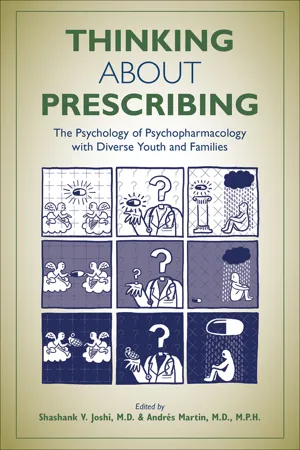
Thinking About Prescribing
The Psychology of Psychopharmacology With Diverse Youth and Families
- 395 pages
- English
- ePUB (mobile friendly)
- Available on iOS & Android
Thinking About Prescribing
The Psychology of Psychopharmacology With Diverse Youth and Families
About This Book
Our remedies are only as good as the way in which we dispense them
That's the central premise of Thinking About Prescribing, a new volume that encourages pharmacotherapists to view the prescribing of a psychiatric medication to young patients not simply as part of a clinical visit, but rather as the beginning of an ongoing alliance with youth and their parents or legal guardians.
The book makes the case for a partnership that doesn't lean on psychiatric jargon or an encyclopedic list of side effects, but instead on measured candor, vulnerability, and—most importantly—time.
Thinking About Prescribing leverages the knowledge of more than two dozen experts as it tackles topics that include: • The essential features of the Common Factors approach and the Y-model of psychotherapy, which highlights how relational aspects of pharmacotherapy are key to child & adolescent psychiatric practice, even for brief visits• How best to utilize the 30-minute Brief Pharmacotherapy Visit (BPV), so that the alliance is nurtured and time is most efficiently utilized• Techniques, adapted from evidence-based psychotherapies, to enhance medication adherence in diverse youth populations• Approaches to adapt psychoeducation for culturally diverse populations, and consider why many youth & families may be skeptical of pharmacotherapeutic interventions• Strategies to cultivate a pharmacotherapeutic alliance when engaging with patients and families via telehealth, including in the school setting• Tips for pediatricians, advanced-practice clinicians, and other primary care providers who conduct pharmacotherapy
The chapters feature key takeaways that distill the most salient points and that aid in knowledge retention.
Rather than raise unrealistic expectations (two chapters acknowledge the reality of practicing when time and resources are scarce), the goal of this book is to help pharmacotherapists mitigate the stigma, apprehension, or resignation their patients may have and instead build and maintain a trusting relationship that will be key to successful therapeutic outcomes.
Frequently asked questions
Information
Table of contents
- Cover Page
- Title Page
- Copyright Page
- Contents
- Contributors
- Uncovered
- Prescriber, Prescribe Thyself (By Way of Introduction)
- Part I: Principles
- Part II: Partners
- Part III: Settings
- Part IV: Populations
- Part V: Research
- Part VI: Becoming
- Gratitude
- Index